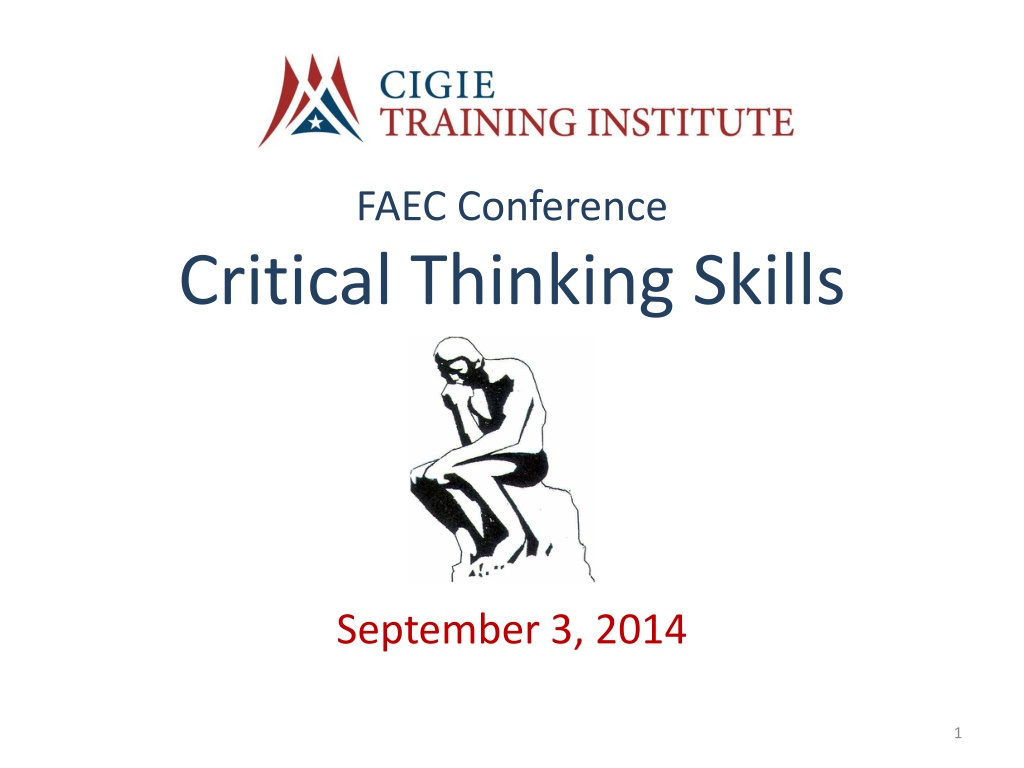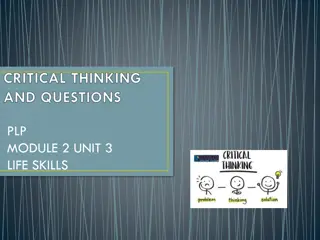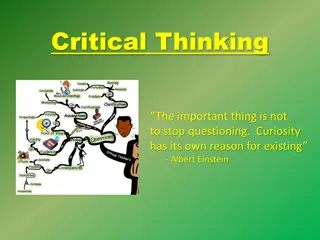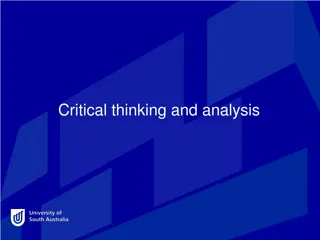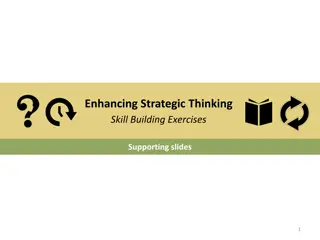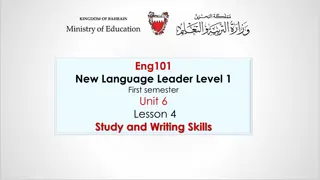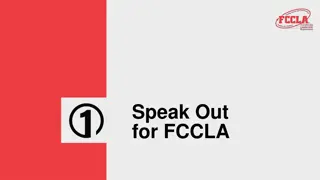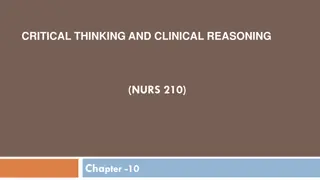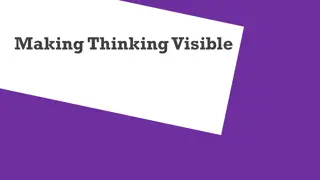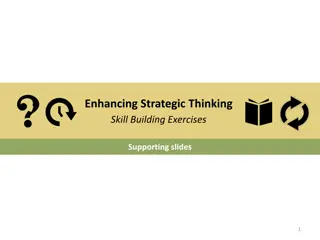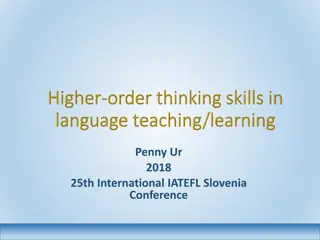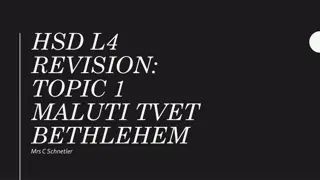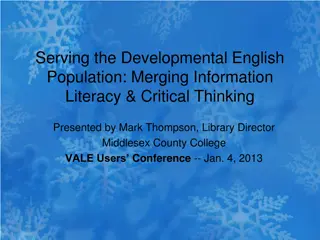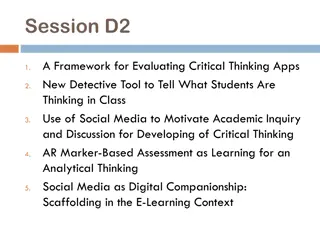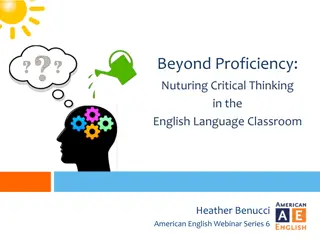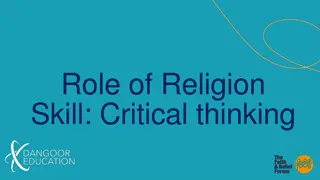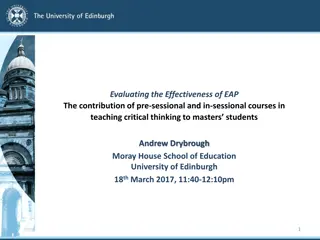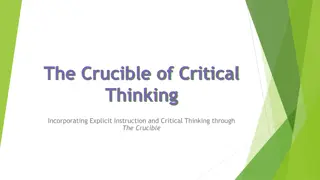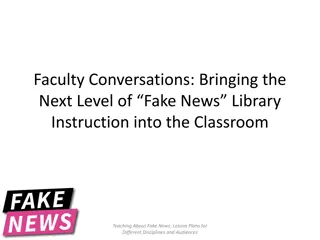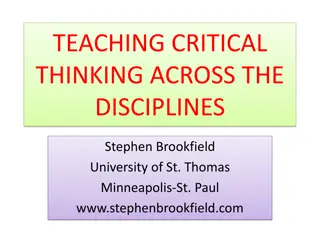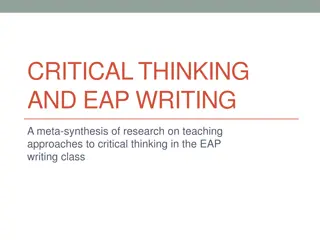Enhancing Critical Thinking Skills Through Training Programs
Explore the world of critical thinking with a focus on training objectives, practical examples, and mind-bending questions to stimulate your cognitive abilities. Discover the essence of critical thinking, its impact on decision-making, and the importance of different thinking styles in problem-solving scenarios.
Download Presentation

Please find below an Image/Link to download the presentation.
The content on the website is provided AS IS for your information and personal use only. It may not be sold, licensed, or shared on other websites without obtaining consent from the author. Download presentation by click this link. If you encounter any issues during the download, it is possible that the publisher has removed the file from their server.
E N D
Presentation Transcript
FAEC Conference Critical Thinking Skills September 3, 2014 1
CIGIE Training Institute increase the professionalism and effectiveness of personnel by developing policies, standards, and approaches to aid in the establishment of a well-trained and highly skilled workforce in the offices of the Inspectors General. The Inspector General Reform Act of 2008 2
Critical Thinking Skills Training Program Training Objectives: understanding critical thinking and the barriers to it knowing your own thinking style learning to de-construct and re-construct an argument identifying the elements of reasoning using Socratic questioning creating effective problem statements comprehending logical fallacies 3
To make you think How many birthdays does the average person have? Two men play five games of checkers. Each man wins the same number of games. There are no ties. How is this possible? An orchard has 29 apple trees and all but 9 die. How many remain? 4
What is Critical Thinking? mental process that affects ALL aspects of your life How often do you stop to think about how you are thinking? 5
What is Critical Thinking? Thinking Non-Critically *sidetracked by displays *prone to impulse buys *buy things you want Thinking Critically Example: Shopping *what buys have I made? *were they good buys? *what do I need? 6
To make you think Someone builds a rectangular house. All sides have a southern exposure. A bear walks by the house. What color is the bear? Why? Divide 30 by and add 10. What is the answer? You have one match. You walk into a room where there is an oil burner, a kerosene lamp, and a wood burning stove. What would you light first? 8
What is Monological vs Multilogical Thinking? Disciplined thinkers think in many different ways (multilogical) versus thinking one way (monological). Collaborative Thinking values teamwork and solving problems together Systematic Thinking values processes and synthesizes them in a methodical, orderly manner Abstract Thinking uses theories and abstractions and is idea-centered Evaluative Thinking assesses for effectiveness and seeks improvement Independent Thinking arrives at own conclusions and tries to improve own intellectual well-being 9
To make you think k m q w 11
What are the Elements of Reasoning? 1. 2. 3. 4. Issue-What is the problem and is it clearly stated? Desired Outcomes-What is the goal or purpose? Assumptions-What are my assumptions and biases? Point of View-What is my point of view and have I sought out other viewpoints? Information-What data do I have and is it reliable? Inference-What can I draw from the information? Consequences and Implications-What are the solutions and the results? Implementation and Monitoring-What should the results look like and how will follow up occur? 5. 6. 7. 8. 12
To make you think Each formula contains the initial of the words that help you translate it: 3 F = 1 Y M + NH + V + M + RI + C = N E P + A + A = 3 M N + P + SM = C S 8 P or 4 Q = 1 G 14
What is Socratic Questioning? A process that elicits information, clarifies reasoning, explores values and slows down your thinking so that you can improve it. It is based on the concept that everything can be discovered through questioning. 15
What is Socratic questioning? focuses on asking open-ended questions meant to elicit more information. It is important to ask the right question at the right time in the right way and then listen for the answer. 16
To make you think Translate each sentence into the more familiar phrase: Scintillate scintillate asteroid minified. Members of the avian species of identical plumage congregate. It is fruitless to attempt to indoctrinate a superannuate canine with innovative maneuvers. Where there are visible vapors having their provenance in ignited carbonaceous materials, there is conflagration. 18
To make you think A college science professor placed 2 ping-pong balls at the bottom of a cylinder (7 in. wide by 5 ft. high) attached to the lab floor. Students had 1 hour to remove the balls using anything available in the lab. If they found a solution, all would pass the final exam. They all failed. What could they have done to pass? 19
and think! 20
Critical Thinking Skills (CTS) Schedule Class Dates December 9-11, 2014 Class Locations Washington, D.C. February 24-26, 2015 May 12-14, 2015 July 21-23, 2015 September 15-17, 2015 Washington, D.C. Dallas, TX Washington, D.C. Washington, D.C. 21
Resource Links CIGIE: http://www.ignet.gov/index.html CIGIE Training Institute: http://www.ignet.gov/pande/training1.html 22
